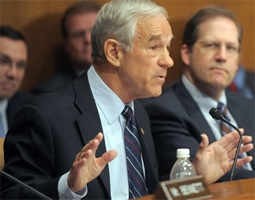
Often called the most honest man in Washington, Ron Paul, the unsinkable Congressman from Texas’s fourteenth district, has positioned himself as resident watchdog for the United States Constitution. Ron Paul holds a point of view that, although echoing the wording of our nation’s founding fathers, rings downright alien to the United States government of today.
We are now living in a nation where Federal social and economic programs are our government, where our currency status hinges on the stock market rather than the gold standard and where our current President has taken more liberties with the United States constitution than any other President in our country’s history. Under these circumstances, Ron Paul just doesn’t seem to fit in. Reason being: we’ve grown accustomed to, and quite comfortable with, large Federal government and the act of re-shaping laws for convenience.
Ron Paul is a conservative, but hardly a Republican – not according to the cookie cutter Ronald Reagan playbook, anyway. He fancies himself a Libertarian and a Constitutionalist, yet in 2007, Paul ran for President under the guise of the Republican Party, a move that seemed out of character, but one that brought his agenda to the mainstream media and sealed his status as a cult hero to an overwhelming number of staunch Ron Paul supporters.
Though liberals, and even some conservatives, often misdiagnose Paul’s agenda, no one in either the House or the Senate can deny the consistency and integrity of his voting record. Many people may not agree with his strict interpretation of our constitution, but everyone defends his character, including Senator John McCain, who was recently denied an endorsement by Paul.
A former physician and devoted family man who never waivers in his beliefs, this quote from RonPaulFacts.com eloquently and humorously sums it up, “Ron Paul is 9 feet tall, but the weight of his conscience makes him look shorter.”
During my conversation with Ron Paul I took every opportunity to get a Washington veteran’s perspective on our current financial crisis, the seven hundred billion dollar “rescue package” which flip flopped its way through the House of Representatives, the value of the U.S. dollar, McCain and Obama politics and the future of our economy.
PR.com (Allison Kugel): What does this bailout mean for the economy, tax payers, and for the future of the U.S. Dollar?
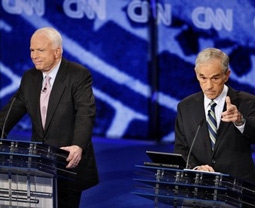
Ron Paul: Well, for the economy it’s bad news, but this has been building for a long time and this is something that many of us had predicted would come, and now we are seeing it. It’s going to be very bad for the tax payer because taxes won’t go down. They’ll try to raise taxes but they won’t be able to so they will just use the tool of the deficit financing and inflation; that is creation of new money and credit which they are doing in wholesale right now. Which is easily translated into a weaker dollar, although that might not occur immediately and sometimes when the Fed comes up with a new program of injecting tens if not hundreds of billions of dollars into the economy this should send a signal to everybody that its going to be devastating to the dollar. Inflation will become much worse, but you might see a temporary reaction where they say “Oh this might strengthen the market and maybe the economy will heal and the dollar will be stronger.” I think everything we are doing now is very, very detrimental to the dollar which doesn’t mean to me that an alternative currency is immediately the answer. The Europeans and the Japanese all have their problems, and they’re all Fiat currencies, too (currency that is not backed by gold, but where the value is instead enforced by the government). So, just because the dollar is week doesn’t mean that it will be weak in terms of all the other currencies immediately. I think it will be weak in terms of purchasing power. That means prices will go up, I believe, in all currencies, and eventually translate into much higher gold prices.
PR.com: Barack Obama compared this financial crisis to a house on fire, and that the fire needs to be put out before we can address the problem and the guilty parties involved. Do you think the bailout package effectively puts out the fire?
Ron Paul: No. It’s pouring kerosene on the fire because the problem was created by government meddling, government regulations, government dictating, government inflation, government spending… and that’s all we’re doing. We’re spending more, running up more deficits, printing more money and trying to regulate away the bad effects of all these policies. So, yes it would be good to put out the fire, but you’ve got to know where the fire is coming from and what caused it all. But, what they’re doing is not putting out the fire. They’re just making it worse.
PR.com: In your book (The Revolution) you mentioned the concept of “legal plunder” and it just seems to apply so perfectly right now. You define legal plunder as “any use of government that enriched one group of people at the expense of another, and which would be illegal if private individuals tried to carry it out themselves.” Do you define this bailout package as legal plunder?
Ron Paul: Oh absolutely, but that’s been around for a long time. I wish I could claim [to be] the originator of that concept. But, that’s something that’s been talked about for years. Bastiat talked about it in the 1850s and he was a Frenchmen worried about the same thing back then. Yes, it is legalized plunder if you and I can’t do it. You can’t steal from your neighbor. We would still go to jail for that. But, if we send the politician to your neighbor with IRS Agents and a bunch of guns they would pretend this was moral, ethical and constitutional, and it’s none of those. So, we’re involved in that, but that’s how we got here because of this assumption that the government has the right to redistribute wealth and regulate and serve special interests. And now they’re doing it wholesale, they’re doing it to try to bail out the people who had benefited for so many years by this system. Now they’re in trouble, and now they want to really get bailed out and dump out all the bad debts on the innocent people. Those many who benefited over the years on Wall Street and in these financial areas now want the average person to buy up all this bad debt. So, we could start off, and I said this on the House floor, it’s an immoral act, it’s an unconstitutional act that makes no economic sense either.
PR.com: You obviously speak a lot about the U.S. dollar and about it no longer being backed by the gold standard as a source of our problems. But, wasn’t the gold standard done away with in the 1970’s?
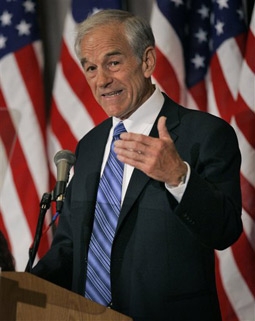
Ron Paul: Well, that was the last nail in the coffin of the gold standard. The gold standard was relatively good in the 19th century but it was abused a lot then. So, we had booms and busts then because they abused it. One of the worst episodes was during the civil war period when they went off the gold standard completely. The gold standard was undermined systematically since 1913 with the introduction of the Federal Reserve System. They kept lowering requirements, and then when we had the Bretton Woods [system] after World War II, we couldn’t own gold since the depression time, but foreigners could turn in 35 dollars and get an ounce of gold from us. So, we were on a gold exchange standard. The dollar was supposed to be as good as gold and foreigners could hold us in check by every once in a while sending their dollars back demanding gold. In the 1960s we got furious with [French President Charles] de Gaulle because that’s what he was doing. After foreigners realized we were printing so much money and we didn’t have that much gold, there was a run on our gold and we had sold off almost 500 million ounces of gold at a price that was below the market, at 35 dollars an ounce. In 1971 is when Nixon declared that in a couple of days we’re not going to have an ounce of gold left. That’s when he closed the gold window and didn’t even pretend to limit the number of dollars printed since 1971. That’s why the big bubble that I talk about has been developing since 1971. And if you look at all the debt charts and the spending charts and the inflation charts, everything just sky rockets after 1971. So, this has been a tremendous bubble built on the inflation of the dollar since that time. Time was just waiting for this thing to burst and that’s what has happened.
PR.com: Why did the economy still thrive in the mid 80s, and then again in the mid and late 90s?
Ron Paul: Because there is a subjective value that we place on currencies and things. It’s not always objective. It’s not the amount of labor we put into an item, but it’s what people think about it. Since the dollar was as good as gold, people thought, “Well, that’s fine.” So, it maintained an illusion of value, and for that reason the foreigners were willing to take it. Even with the breakdown of Bretton Woods, some people thought it would end right then. But, once again, restoration of confidence in our dollar came, we were a powerful economy and we had the military power, so there was a bit of a trust placed in the dollar, and it was in many ways a false trust. As long as people trusted the dollar, we could print dollars and we didn’t have to work as hard. We became a consumer nation and had this huge current account deficit. No matter what Federal Reserve chairman we had or any accountancy for, our committees, they always admitted the current account deficit was always bad news for us, and it certainly was. Eventually the confidence was lost and that’s what’s happening now. They’ve lost confidence in the system because we’ve had too much debt, too much inflation and now the correction has to come. Think of it as an individual who can borrow a lot of money and the bank keeps loaning it to him, and then the bank says “Hey we’ve loaned you too much and you better pay it off.” Then that person has to go back to work again. That’s what’s happening to us.
PR.com: How can we regulate our currency again?
Ron Paul: The market should regulate the currency. The only thing the government should do is make sure there is honesty. If you say you have a currency that is backed by gold and convertible to gold, the government is supposed to guarantee the contract and guarantee the value of the currency. That is a role given to the government by the constitution, but they did exactly the opposite. They destroyed the value of the currency, and they became the counterfeiter. So, Congress’s role is to make sure that we have honest weights and measures, and that if we do have gold and silver coins that we know what those weights are. And if people create instruments that are related to that paper instruments credit that they are held responsible for the contracts that they make. Today our government spends more time breaking contracts than maintaining contracts.
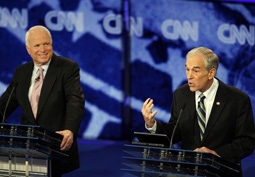
PR.com: Would we, in fact, have gone into a depression, as President Bush expressed, had we not come up with this… is it $700 billion or $800 billion rescue plan?
Ron Paul: It’s estimated to be $850 billion now.
PR.com: Ok, so first congress said no to $700 billion, and then they change it to $850 billion and all off a sudden congress says “Ok.”
Ron Paul: Right.
PR.com: That makes no sense.
Ron Paul: Fifty-seven people, a lot of conservatives, switched their votes [to yes] after it got worse (laughs)! So many people got special benefits, so they were talked into it and they were frightened, and they said terrible things would happen. My argument on that floor was that, “Yeah, if you don’t vote for this, things are going to be tough, but if you do vote for it things are going to be a lot tougher, because you are doing all the same things that caused the problem. You’re inflating the currency, you’re spending too much and you’re borrowing.” The markets evidently realized that really quickly, that there were no solutions in that bill.
PR.com: Was President Bush correct in saying that we would have indeed gone into a depression?
Ron Paul: He was, but not because if we didn’t spend the bill. It might not be too radical of a statement to say that we are destined to go into a depression. So, that’s not all that radical to say that. But, he used that as a scare tactic by saying that if you don’t vote for this we’re going go into a depression. It’s like saying, “If you don’t invade Iraq they might bomb us with a nuclear weapon.” I mean, they are just not telling us the truth.
PR.com: Do you think that either Barack Obama or John McCain has what it takes to get us back into the black, financially?
Ron Paul: I don’t think they even have a desire to do that, because people now don’t think you should ever balance your budget in times like this. They don’t even pretend to do that. Republicans are sort of like, what Dick Cheney said not too many years ago. He said, “Well, we don’t have to worry about deficits. Ronald Reagan taught us to live with a deficit.” Conservative supply-siders think the deficits don’t matter all that much and liberals never care. So, no, neither one of them has a desire to, nor would they know how to do it, because they both endorse this empire we are operating around the world. It’s the empire that’s bringing us to our knees and if we don’t address that there’s no way we can solve our problems.
PR.com: You’ve clearly outlined your political principles on many occasions as being that of a Libertarian. I’m curious as to why you ran in the Presidential primary race last year as a Republican candidate?
Ron Paul: Because the system is so biased against alternative parties. There’s a monopoly control over our system. Republicans and Democrats are actually alike on economic policy, monetary policy, foreign policy… everything. They pretend they are a little bit different, but just look at how McCain and Obama came out strongly for the bailout package. So, there’s no difference, they’re both for sending more troops to Afghanistan, they’re both for all these laws to address the subject of terrorism and the Patriot Act. There’s really no difference between them, so in order to get any attention you can’t do it as an outside party. Do you think they would allow anybody in the debates other than the two candidates now? And yet, in Canada they have four or five of their candidates in debates up there; but, not in America. You have to have the monopoly exclusion of anybody who has a different opinion who might attack the status quo. They won’t allow it, so I got a lot more attention in the Republican Primary than I would have in a third party. And besides, the Republican Party brags about a big tent. Here I am, I was the most conservative, strict constitutionalist, protection of liberties, right to life and all these things. And they say they don’t want you in the party. It was a little bit bizarre when you think about it.
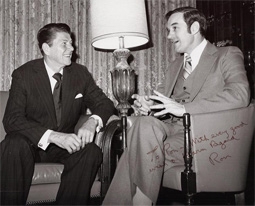
PR.com: What were some of the key issues that led you to reject John McCain’s request for your endorsement of his campaign?
Ron Paul: I couldn’t find anything that we agreed on. He’s voted for high taxes, he’s supported that position. And one of the most important issues to me was the war. I wanted the troops home immediately and he doesn’t care if they stay for one hundred years. He doesn’t have much interest or concern or understanding about the financial problems of this country. He doesn’t care about the Federal Reserve and how the Federal Reserve is the culprit in so much of what we are doing. Civil liberties have been no concern to him. He passed the McCain-Feingold bill which is an attack on first amendment rights. So, to support somebody I have no agreement with just didn’t make any sense.
PR.com: So, it’s surprising that he would even approach you for an endorsement, don’t you think?
Ron Paul: Well, he never did, personally. One person came to me but he wasn’t officially representing the campaign. But, I’ve had individual Republicans say “Hey, now that this is over are you going to support him? We’ve got to have unity.” I said, “Well, if you’re unified for things you don’t believe in, what good is it?” So, no, they never made any approach. They did everything they could to keep our people out of the convention.
PR.com: What do you make of John McCain’s involvement in the Keating Five scandal and the savings and loan crisis that took place in the late 80s, being that it echoes what’s going on right now?
Ron Paul: I think it shouldn’t surprise anybody, but I’m surprised that he gets away with talking about being a reform candidate (laughs). Just think about all the lobbyists that have been for him and running his campaign. He is for more money going to Georgia and protecting that oil pipeline. Well, his chief advisor on foreign policy was a lobbyist for Georgia and the media hardly even touches this stuff. The idea that he’s a reform candidate is a bit of hypocrisy, to say the least.
PR.com: During the Presidential primary campaign it was widely reported that you were a victim of what was called a “media blackout.” It was also reported that Fox News had excluded you from one of the Primary Republican debates. Why is the media so afraid of you?
Ron Paul: I don’t know. I haven’t completely figured that out. I think the media sometimes is in alliance with the establishment government and the military industrial complex. So, they don’t want to see a light shone on actually what they are doing. They would just assume not to see me get any traction. And it’s true that on a key night before a primary in New Hampshire I was excluded from that, which more or less sent a signal that he’s not a viable candidate and he’s not even part of the debate.
PR.com: In the wake of the bailout and the fact that Barack Obama and John McCain had supported it, you mentioned some of the corporate PAC sponsorships that each candidate had been receiving very generous amounts of money from. With those kind of contributions, how beholden are each of these candidates to those corporations? And how much wiggle room does that leave for them to actually act on behalf of the American people?
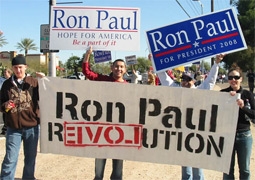
Ron Paul: Well, they could, if they were men of high character, overcome that. But, the suspicion is when you get that type of money they will get some attention if either one of them wins. You will notice that many times those PACs (Political Action Committees) donate to both sides, because they want to have influence. I think that is just symbolic of the system. It’s a system that is designed, right now, to be run by powerful special interests who have the money.
PR.com: But, isn’t the PAC money kind of a catch-22 for politicians? If a candidate does not have that kind of money backing them, they really have no shot of getting any kind of significant exposure or winning the Presidential election.
Ron Paul: That’s pretty much the case, and that means the form of government that we have is nothing more than redistribution of wealth. Almost goes back to our first question. It’s plunder. Everybody’s involved and they have an interest in it, to invest in it. It’s very hard to reverse that because the role of government isn’t to protect freedom and provide for a strong national defense. The role of government now is to re-distribute wealth, and it’s supposed to re-distribute wealth from the rich to the poor, but for some reason or another it seems like the very wealthy get a lot more welfare than the poor.
PR.com: Is it fair to say, let’s take a guy like Barack Obama… he comes to Washington with only the best of intentions. He decides he wants to run for President because he really cares about the middle and working class. But, he knows that in order to actually get into office, if he doesn’t take PAC money he doesn’t have a shot. Doesn’t it sort of put somebody, even with the highest character, in a situation where they have to do something bad to do something good?
Ron Paul: Yeah, but that wouldn’t justify it. They would probably rationalize it to that extent. I mean, we did raise a fair amount of money (referring to his Presidential bid during the primaries in 2007), if we had a fair shot with [media] coverage and all, we could have even done better. We raised about 35 million dollars with mostly small donations. I’m sure there’s a PAC in there with one or two of them. But, there was no dependency whatsoever on PAC money, so it is conceivable. The way the system is designed, that money is going to talk. It is justifiable to take PAC money. My position on it is that I would take PAC money, but they don’t send it to me because they know they can’t influence me, because it’s legal to take PAC money. But, the fact that they give it to [certain] individuals, they know that they are buying influence. First, it has to do with what our role of Government is; it’s too much involved in everything that we do. And then we have politicians who can’t resist the temptation to participate in the game, so then they become very dependent on the money. You’re right about that. The current circumstances are that they are going to depend on this PAC money, but that just tells you what kind of system we have.
PR.com: What are your thoughts on Governor Sarah Palin and Senator Joe Biden as Vice Presidential candidates? What do you think of those choices?
Ron Paul: (Laughs) Not much more than the other two (referring to Barack Obama and John McCain). I don’t think they have any difference in opinion. I mean, Joe Biden was a great instigator of the Iraq war. He really promoted it, and now he’s pretending he’s anti-war. And she’s pro-war because she’s going along with the radical neo-cons that John McCain represents. They’re all the same. Philosophically, I can’t see any significant difference.
PR.com: Any thoughts on some of Barack Obama’s personal and professional associations that have been called into question by Sarah Palin and John McCain?
Ron Paul: There’s enough that they say, currently, on policy that should give us enough ammunition for not voting for them, rather than going back that far and talking about what their preachers might have said ten years ago.
PR.com: Lastly, I want to go through a few of your staple policy beliefs. Number one, your foreign policy beliefs are strictly non-interventionist. Is that your stance largely because of our recent pattern of invading for oil? And to play devil’s advocate with you, as an extreme example, would you say that our involvement in World War II was necessary and justified, in your opinion?
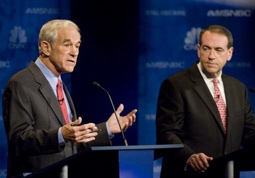
Ron Paul: Non-intervention policy comes from my understanding of history because there is no authority in the Constitution for us to be the policemen of the world, or to get involved where our national security is not threatened. The founders advised against this, stay out of entangling alliances, don’t get involved in internal affairs of other nations. That’s been our tradition, the old right Republican tradition has been that way. They tried to steer us away from wars during the thirties and even earlier than that. So, there’s always been this tradition and there’s always been a coalition sometimes with the old right position, and even the progressive socialists. Even today I have agreements on this with the Green Party and with Ralph Nader who is a Progressive, as well as the Libertarians and the Constitutionalists. So, there is a strong tradition. Of course these last forty or fifty years confirms the fact that it’s idiotic to be involved constantly. And, we are doing exactly what the Soviets did. We are spreading ourselves too thin around the world, exactly what Osama Bin Laden wanted us to do. The morale of our troops has been diminished, our military might has been diminished, and we are bankrupting our country. Now, when it comes to World War II, it’s pretty hard not to retaliate against a force like Japan when they attacked us. But, if you understand history, Pat Buchanan has written this fascinating book just recently, it was also unnecessary. World War I was absolutely unnecessary. We should never have gotten involved in that, and that set the stage for the Versailles Treaty, set the stage for Hitler and set the stage for World War II. If we had a constitutional republic we wouldn’t have had any of those wars in the twentieth century. We would have stayed out of World War I and we wouldn’t have to do anything else after that. When a county finally attacks you, even if it’s a result of our stupid policy, you have to retaliate to try to stop the violence. You just can’t sit back and let them bomb us, but you have to understand why they’ve done it. You see, we had an oil embargo on Japan before World War II, and they were just protecting their interest. But, a non-interventionist foreign policy would be a blessing to this country if we were to ever follow it again.
PR.com: As a rule, you believe that Government’s sole involvement in our lives should be the protection of our liberties and protection of our property. Where do you stand on things like social security, Medicare and Medicaid and Federally funded student loans given to us by the Federal Government?
Ron Paul: It’s back to the plunder. Government can’t give you anything. They had to steal it from somebody else. None of those things you mentioned are, in a strict sense, constitutional. They should be done either in the private sector or by local government. My position on it right now is that we are so entrenched with that, that if I had the authority, like tomorrow, to stop, say, a medical program for the elderly I wouldn’t do it. Even though technically it’s unconstitutional, what I would do is have a transition period. If we want to get our budget balanced and get back to a strictly limited government, I would cut all the money from overseas, because, those are hundreds and hundreds of billions of dollars. If you cut enough, balance the budget, pay back some of the deficit and take care of those people who have been totally dependent on us for so long and we actually took money from them with the promise that we would give it back to them, whether its Medicare or social security. And then let the next generation get out of it and have a transition period. But no, this promise that Government can get people these things begs the question where does government get it? They have to steal it from somebody else.
PR.com: What about the involvement of the government in Roe vs. Wade? You’re pro-life and you feel that abortion should not being legal, but isn’t that something where the government would then be involved in what women are doing with something as private and personal as their own bodies?
Ron Paul: On Roe vs. Wade I think they should not even have heard the case. I would repeal Roe vs. Wade. The question is, is killing a live human infant that is viable, whether that is an act of violence. If it is, states have the obligation to deal with the issue of violence and that’s all that Texas was doing before the Roe vs. Wade ruling. I would say that this should still be handled at the local level. The question isn’t so much what you can do with a woman’s body, as much as, is the unborn [fetus] a human being, and does it deserve legal protection? It has legal rights. I, as a physician, if I had injured the fetus I could be sued. If an individual is in an accident and the woman has a miscarriage, you can be sued for the loss of that life. If there is a homicide, it’s a double homicide if you kill the woman and the [unborn] baby. Inheritance is legal at the time of conception, so there is a lot of legal precedence for that. It just happens that the baby within the womb is different than the baby in the crib. But legally, there’s not a whole lot of difference.
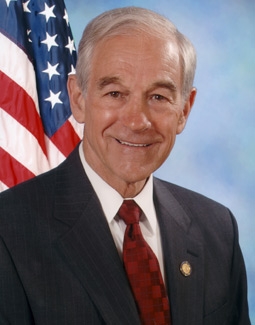
PR.com: But, you think it should be handled at the state level and not by the Federal Government?
Ron Paul: We shouldn’t have a Federal abortion police.
PR.com: Being that you’re a strict constitutionalist, are there any circumstances or any potential circumstances you could imagine where you would concede that either desperate times calls for desperate measures, or that we need to change with the times. Being that the constitution was put in effect in the year 1788, and we are now in the year 2008, does there come a time where it’s logical to say that something may not be applicable to the twenty first century, and could we ever become martyrs to our constitution?
Ron Paul: Oh, no. I think that’s the great part of the constitution. It was designed to evolve and to change, but slowly. If the people of this country think that there is an advantage to having Federal control of the educational system, that’s fine, just change the constitution. But, if you can ignore the constitution and do it anyway then there’s nothing left of the constitution. The rule of law has been destroyed and this is what happened to our fourth amendment, this is what happened to our foreign policy; we don’t declare wars anymore. But, if people want to change the constitution and modernize it, I don’t think there is anything wrong with that. It just has to be done properly. If you can ignore the constitution, there is nothing left. Unfortunately, as far as the people that I know in Washington, whether it’s in Congress or an Executive Branch or in the Judicial Branch, we are at the point where the constitution has very little meaning.
To purchase Ron Paul’s book, “The Revolution: A Manifesto,” visit Amazon.com
To learn more about Congressman Ron Paul, visit - www.campaignforliberty.com and www.house.gov/paul/
